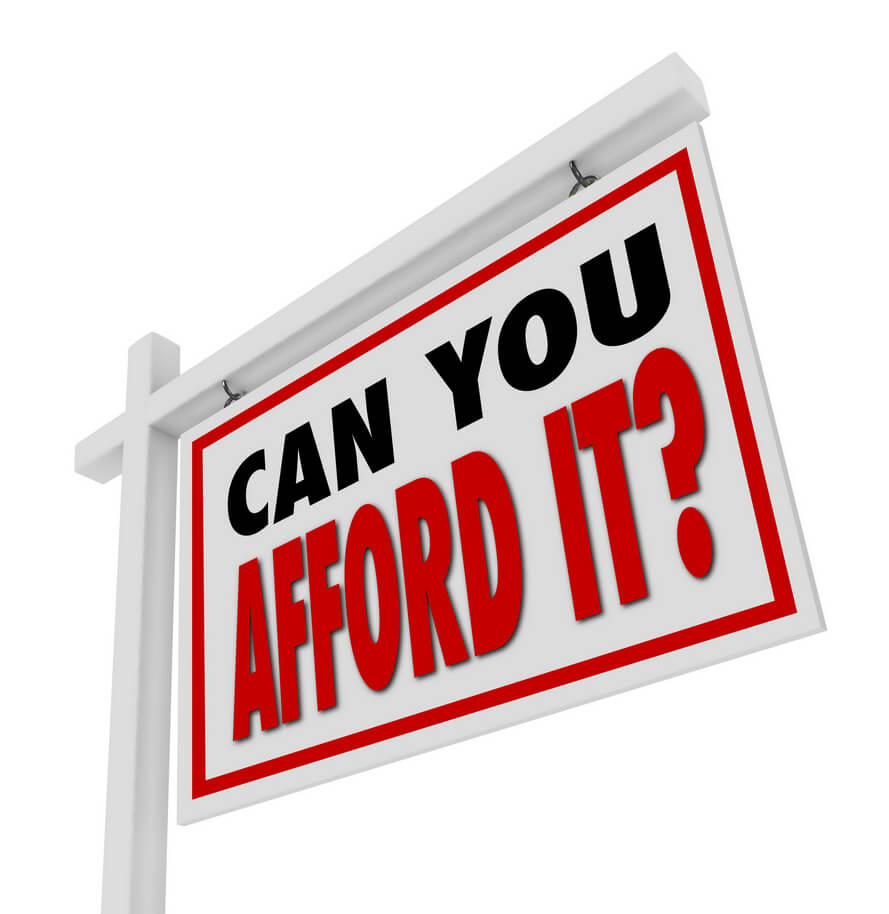Buying a home is an enormous financial commitment, so you should be certain that you’re prepared for your monthly payments.
Before you start your home search, you should know exactly what you can spend so that you can narrow down your search and feel confident in your purchase.
There are a number of considerations to keep in mind as you figure out your housing budget. Here are five areas to look at to determine how much house you can afford:

Income
Your income is possibly the most important factor in determining what you can afford for a mortgage payment. When you calculate your monthly income, use your take-home pay after taxes and any contributions to a 401(k) or other retirement account.
Different experts offer different opinions about how much of your monthly take-home pay should go toward your mortgage. Most recommend spending 25 to 33 percent of your income on your house, which includes expenses like property taxes and home insurance.
This is a general rule, though, so you should always consider your specific circumstances when calculating how much house you can afford.
Consider how your income may change over time, but don’t commit to a larger mortgage than you can afford right now just because you’re optimistic about a pay raise in the future. You don’t want your mortgage to be a financial burden at any point.

Debts
Your other debts can make a big difference in how much income you can put toward your mortgage. Car payments, student loans, and other payments can cost you hundreds of dollars per month, which can significantly reduce the available income you have to spend on your home.
The 28/36 rule is common advice for calculating an ideal mortgage payment. According to this principle, your home-related expenses should account for no more than 28 percent of your monthly income, and your total debt payments including your mortgage should not exceed 36 percent of your monthly pay.
Getting behind on debt payments can be financially devastating. Even missing just one monthly installment could lead to late fees, a derogatory mark on your credit report, and other consequences.
To reduce your risk of missing a payment, be sure that your total debts don’t take up too much of your income.
It may be wise to pay down your current debts as much as possible before applying for a mortgage. Some financial experts recommend becoming entirely debt-free before buying a house.
A low debt-to-income ratio is also appealing to lenders, so you could get a lower interest rate on your mortgage if you minimize your debt.

Expenses
In addition to your monthly debt payments, you should consider all of your other expenses as well. Living expenses vary drastically from person to person.
Someone with very few expenses may be able to afford a larger mortgage than someone with a higher cost of living even if both people have the same income.
It’s important to have an accurate idea of your monthly expenses when applying for a mortgage. If you don’t keep careful track, the small and forgotten costs may add up and make your budget much tighter than is comfortable.
For one or two months, keep a log of all of your bills and purchases. This should give you a good idea of how much money you have leftover to go toward your mortgage, and it can help you identify ways to cut some spending if you need to save up for a down payment.

Savings
There are two uses for your savings when it comes to home ownership: your down payment and your emergency fund. A larger down payment means a smaller mortgage, so saving up certainly helps you afford a larger home..
Also, if you’re able to make a down payment of 20 percent, you may not have to pay private mortgage insurance. This can give you some extra room in your budget for a slightly larger mortgage payment.
The amount you have leftover in your savings account after the down payment matters, too. It’s recommended that you have at least three months of living expenses in an emergency fund. When you have this extra security, you can have peace of mind about a mortgage payment that’s on the higher end of the recommended range.
If you don’t have an emergency fund, your mortgage payment shouldn’t exceed 25 percent of your monthly income. Any unexpected expense could put a strain on your budget and lead to missed payments.

Credit
Your credit score is a major factor in the terms of your mortgage. A strong credit history can get you a lower interest rate, which allows you to spend a little more on your house.
Keep in mind, though, that you may be approved for a mortgage that’s higher than you can really afford. This is especially common if you have a good credit score. Regardless of what your lender offers, don’t take on a mortgage that you can’t comfortably and confidently pay every month.
Buying a home should be an exciting and rewarding experience, but committing to more than you can afford will only lead to stress.
To set yourself up for financial success, consider all aspects of your finances when setting your price range for your house. Then, only look at homes within your budget so that you don’t feel tempted to overspend.
————————
Michael Carr is the Co-Founder & COO of BrandFace, LLC. He is also a real estate branding expert and international bestselling author. As America’s Top Selling Real Estate Auctioneer, he has sold billions of dollars in commercial and residential properties.


